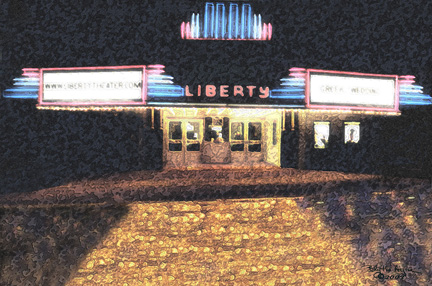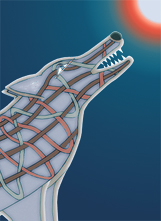
Werewolves (continued)
Werewolves Everywhere
In some cultures, being born during a new moon or suffering from epilepsy were considered conditions to produce a werewolf. The new moon aspect alone would produce roughly a twenty-eighth of the human population who are actually werewolves. Hmmm....
In Russian lore, a child born on December 24 will become a werewolf.
In Portuguese and Brazilian belief, either the seventh son, or the first son after six daughters, will be a werewolf.
In Argentina, the seventh son, due to the same belief, was generally abandoned, given away, or murdered, until in 1920 the president of Argentina declared himself the godfather of all seventh sons, and each seventh son is given a gold medal at birth and a scholarship until he is 21.
Werewolves are found all over the world, if the recountings of history are accurate.
In addition to the other countries already mentioned, there are stories of werewolves in Albania, Bulgaria, Bosnia, France, Turkey, Czechlokavia, the Ukraine, Macedonia, Germany, the Netherlands, Lithuania, Hungary, Estonia, Greece, Spain, Mexico, Romania, Italy, Croatia, Scotland, Poland, England, Norway, Iceland, Denmark, Sweden, Latvia, Andorra, Finland... in other words, pretty much anywhere there are wolves, and even some places where I believe they are not.
Prince Vseslav of Polotsk, an 11th Century Russian prince, was believed to be a Werewolf, and was observed moving at superhuman speeds.
In Latvia the werewolves were often benevolent, while in Armenia, sinful women were required to become wolves for seven years.
During the sixteenth century in France there were multitudes of reports of werewolf attacks.

© 2006 - August Emerson
Among the central Asian Turkic peoples, the shaman, through long and arduous rites, would transform into the humanoid “Kurtadam,” that is to say, wolfman, in honor of the wolf, which was the totemic animal of Turkic peoples. The wolf form shaman would receive great reverence while in this form.
Vulnerabilities to Watch for While in Wolf Form, Removing the Wolf Form
Everybody knows a werewolf must watch out for wolf's bane, a plant that is said, charmingly enough, to have sprouted from the drool of Cerebus. Now, why a plant nurtured by one dog would harm another I’m not clear, but there you have it, just the same.
Other means of returning from wolfdom are:
Asking an enchanter to remove the form
For the werewolf to lose at least three drops of blood
Removing the wolf hide (well, duh!)
To kneel in one spot for 100 years (wouldn’t taking off the wolf hide come to mind before that time was up?)
To be struck three times on the forehead with a knife... let’s see, is that flat side or pointy end?
To fling an iron object at the werewolf. Apparently whether the iron object hits the werewolf or not doesn’t matter, it’s simply the molecules of iron flying about a werewolf that causes it to return to human form. Hey, I don’t make up the magic, I just report it.

Werewolves at the Movies....
In 1941 Lon Chaney Jr. transformed into a werewolf during full moon, thus initiating our archetypal portrayal of the werewolf.
In 1935 Universal Pictures produced the first feature length werewolf film, Werewolf of London.
Guy Endore’s novel, The Werewolf of Paris (1933) was made into The Curse of the Werewolf in 1961 by Hammer Films.
In 1981 the cult horror-comedy classic An American Werewolf in London was produced.

And Elsewhere....
In the 1992 RPG Werewolf: The Apocalypse, players role-play various werewolf characters, working on behalf of Gaia against the forces of destructive industrialization and pollution of Wyrm.
In 1978 Whitley Strieber wrote The Wolfen, and in 1991 The Wild, both novels of sympathetic energies toward the werewolf.
And, of course, Harry Potter has werewolves coming out of his ears... well, not literally yet, but you never know. There is the sympathetic werewolf Remus Lupin, and the villainous werewolf Fenrir Greyback, who bit Remus when he was a child, thus infecting him with lycanthropy.
And then there are short stories too numerous to mention, but most all a delicious read on a long, cold winter’s night......